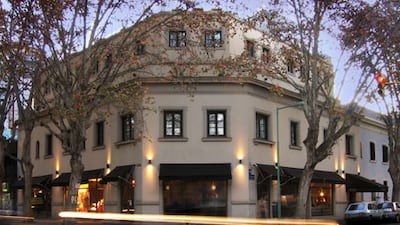There's no bowing or scraping from a bellboy meeting you at the door. Rather refreshing. Instead, the switched-on reception staff ask you if you need help with your bags. The full five-star treatment is available if you want it, but you're able to carry your own luggage without too much fuss should you prefer. Each guest is left a hand-written welcome note in their bedroom, as well as a delicious platter of bite-sized brownies laced with Argentina's sweet-toothed vice, dulce de leche, topped with a strawberry - a nice touch.
Nuss is situated in Buenos Aires' hippest neighbourhood: Palermo. A couple of decades ago the barrio was fading around the edges - rundown yet pretty - but since the 1990s it's become distinctly upmarket. One of the city's most desirable places to live, the area is a mix of low-rise residential housing and boutique clothes shops, bars, cafes and restaurants, which come together around Plaza Serrano, about a minute's walk from the hotel. Hip, young and artsy, the neighbourhood still has some of its bohemian spirit from yesteryear and street graffiti is ubiquitous. Palermo feels like a cross between parts of New York and San Francisco, reflected in the slightly pretentious subdivisions that have sprung up: the hotel is located in Palermo Soho, down the road from Palermo Hollywood.
The hotel attracts a clientele of well-dressed urbanites who are a mix of Argentine and international guests. Nuss is pretty evenly split between tourists visiting Buenos Aires and those here on business. The hotel regularly puts on corporate events, and in the past the hotel has been completely booked up for Paris-Dakar race, as it was once known before it moved to Argentina and Chile last year.
Nuss is a small boutique hotel, consisting of 16 rooms and six suites. The superior double where I stayed was extremely comfortable, with a large flat-screen television, cream walls and grey swirly wallpaper above the bed, as well as colourful decorative tassels by the windows. The walls weren't decorated at all - which made it feel less cosy - but the rooms become more adventurous if you upgrade. What's nice about the hotel is that no two rooms are the same and, while this is a modern, internationally orientated hotel, it keeps an Argentine flavour through old black and white photos of Buenos Aires landmarks. All rooms have a Wi-fi connection and the suites have a special hydro massage bath.
Excellent. The hotel's employees have been lured from some of Buenos Aires' most prestigious hotels, including the Four Seasons, and customer service is of the highest standard. The front desk staff are efficient and helpful, dropping your name into conversation with just the right amount of frequency to make your feel important without being over-pampered. When I went up to the rooftop solarium, a waiter arrived within minutes to check whether I'd like something to drink, and in the evening staff knock on your room door offering biscuits and mineral water to keep you going until it's time to head out in search of a prime cut of steak.
Nuss has purposefully made food quite a low-key part of the hotel. There's an area on the ground floor opposite the lobby where the hotel puts on a decent buffet breakfast, but there is no formal dining. The hotel has decided not to compete with the scores of different restaurants located within a few minutes walk of the entrance - from traditional Argentine eateries serving grilled meats to minimalist sushi joints - and there's a list of recommended local restaurants in the rooms along with tourism information.
The lounge, which is also open to non-residents, has a good range of light snacks. My partner and I shared a delicious Palermo baguette of jamón serrano, sun-dried tomatoes, cheese and salad (US$4.70; Dh17), as well as a salad of the day ($5.20; Dh19) of smoked salmon with green leaves and croutons. The same menu is also available as room service until 2am, at slightly higher prices.
The sauna that is available to all guests. The rooftop solarium is also a lovely space, a simple but elegant combination of wooden decking, square seats and chaises longues with cream cushions. It's a great spot to take in the early evening sun, sip a drink and contemplate the neighbourhood from above. The layout of the hotel is very chic: set on three floors around an open-roofed courtyard full of plants. You can open your room door and immediately gaze up at the sky.
For such a comfortable hotel the bathroom felt a little bit sub-standard. You had to step into the bath, which is quite small, to take a shower and the pressure wasn't very good (in my room the water didn't go down the drain properly either).
A small, friendly hotel full of individual touches and situated in one of the best neighbourhoods in the city both for eating and drinking, as well as getting downtown. Hard to fault and highly recommended.
A double room at the Nuss costs from $266 (Dh977) per night, including breakfast and taxes. Nuss Hotel, El Salvador 4916, Palermo Soho, Buenos Aires, Argentina, (0054 11 4832 9939; www.nusshotel.com).
travel@thenational.ae

